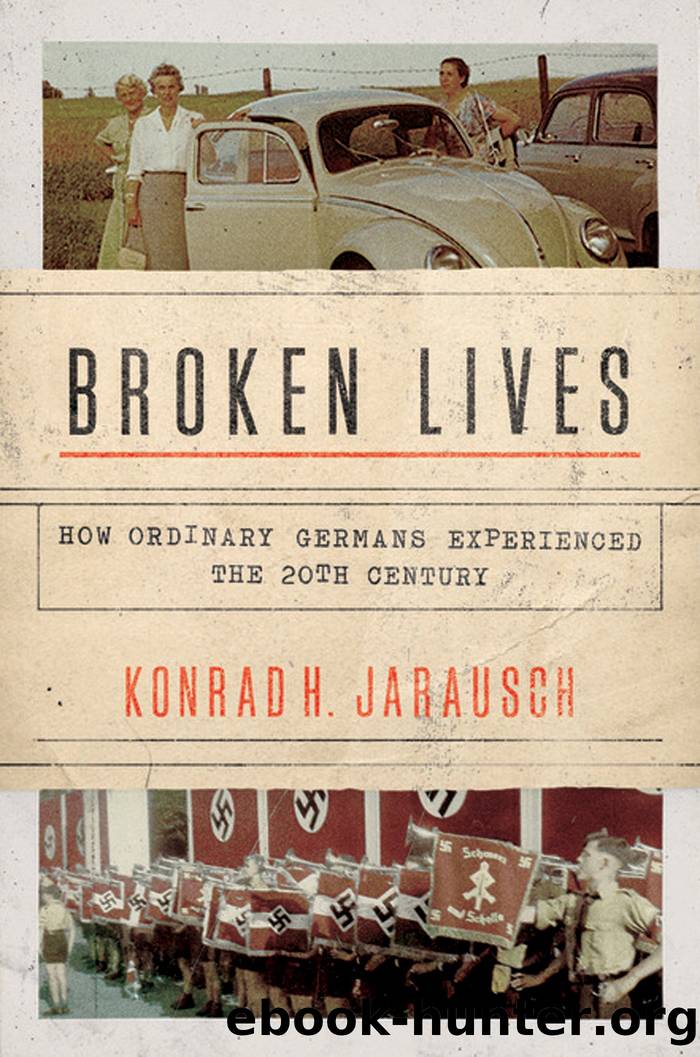Broken Lives by Konrad H. Jarausch

Author:Konrad H. Jarausch [Jarausch, Konrad H.]
Language: eng
Format: epub
ISBN: 9780691174587
Publisher: PrincetonUP
Published: 2018-07-15T05:00:00+00:00
PART III
POSTWAR ADULTHOOD
â7
DEFEAT AS NEW BEGINNING
During his prerelease interrogation in the summer of 1945, Martin Sieg anxiously faced a British major who introduced himself as a Polish Jew. For a moment, the German POW hesitated, but then confessed that he was an officer candidate of the air force from Rastenburg in East Prussia. After asking, âWas Adolf Hitler not there?â the major demanded, âWere you not also a leader in the Hitler Youth?â Overcoming his rising panic, Sieg claimed that âanyone who was relatively intelligent and athletic automatically became an HJ leader without being asked.â To his surprise, the officer jumped up and saluted him, showing his respect. âYou are the first of almost a hundred of your comrades who has admitted to having been an HJ leader.â More generally the questioner went on: âIf Germany wants to start over again, the Germans have to confront their past, no matter how they acted during that time.â Sieg was overwhelmed by the humanity of the officer: âThis Polish Jew had shown me a way to a new beginningâwithout hatred, accusations or threats.â1
Only gradually did former soldiers realize the full implications of having âreally lost the war.â Seeking to return to his fatherâs house, Erich Helmer walked through a veritable desert: âIndeed, as far as one could see, rubble, rubble and rubble as well as ruins which jutted ghostlike into the sky.â On the cellar wall of a destroyed house, he found a message: âWilly, we are still alive and living with Else.â Looking for the main road, Helmer encountered a distressed woman, pitifully querying whether her son had survived: âHave you seen Paul?â Counseling her to be patient, he wondered âhow many Pauls will never come back?â Seeing trucks filled with debris made him wonder: âWill it ever be possible to get rid of all the ruins, the rubble?â And âhow long will it take, until new life will grow out of the ruins?â2 The utter devastation of most cities threatened the survival of those who had gotten through the war. The Germans now confronted the hunger, cold, and suffering that they had earlier brought upon others.
Almost worse than the physical challenges were the psychological difficulties caused by the political disorientation due to the loss of the war. For everyone the future seemed without hope. âWe youths were especially badly off, because we had no training and no occupation.â Martin Sieg wondered, âWhat prospects existed for us in a shattered Germany? To me the past which had only left emptiness seemed like an apparitionâ that nobody wanted to talk about. Nationalists like Karl Härtel complained bitterly that, after winning for years, âwe lost the war and everything, home, property and the claim to historical justice.â In the prison camps, captives struggled to understand the reasons for the defeat, with unregenerate Nazis who tried to hang on to their misguided faith coming to blows with budding democrats who were willing to admit Germanyâs crimes. Captivity âwas the end of high-flying plans and dreams,â Hermann Debus recalled.
Download
This site does not store any files on its server. We only index and link to content provided by other sites. Please contact the content providers to delete copyright contents if any and email us, we'll remove relevant links or contents immediately.
Blood and Oil by Bradley Hope(1558)
Wandering in Strange Lands by Morgan Jerkins(1417)
Ambition and Desire: The Dangerous Life of Josephine Bonaparte by Kate Williams(1383)
Daniel Holmes: A Memoir From Malta's Prison: From a cage, on a rock, in a puddle... by Daniel Holmes(1328)
Twelve Caesars by Mary Beard(1313)
It Was All a Lie by Stuart Stevens;(1294)
The First Conspiracy by Brad Meltzer & Josh Mensch(1167)
What Really Happened: The Death of Hitler by Robert J. Hutchinson(1154)
London in the Twentieth Century by Jerry White(1145)
The Japanese by Christopher Harding(1130)
Time of the Magicians by Wolfram Eilenberger(1125)
Twilight of the Gods by Ian W. Toll(1113)
A Woman by Sibilla Aleramo(1092)
Cleopatra by Alberto Angela(1092)
Lenin: A Biography by Robert Service(1073)
John (Penguin Monarchs) by Nicholas Vincent(1068)
Reading for Life by Philip Davis(1023)
The Devil You Know by Charles M. Blow(1023)
The Life of William Faulkner by Carl Rollyson(980)
